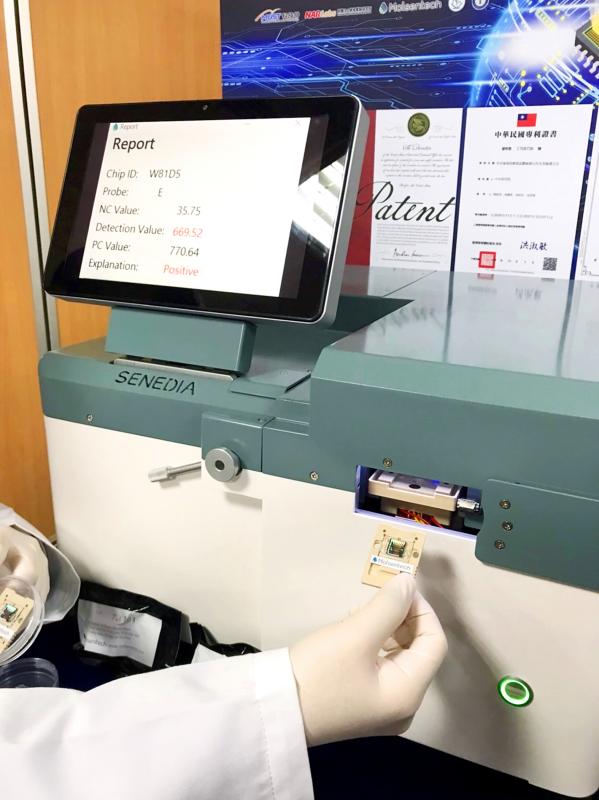Taiwanese researchers have designed the world’s first microchip platform capable of detecting SARS-CoV-2 within three minutes, the National Applied Research Laboratories (NARL) said yesterday, adding that the field-effect transistor biosensor (Bio-FET) is expected to hit markets as soon as next month.
The chip, which was in December granted emergency use authorization (EUA) by the Food and Drug Administration, resulted from joint research conducted by Molsentech (矽基分子), Academia Sinica, the NARL’s Taiwan Instrument Research Institute and Kaohsiung Veterans General Hospital.
Yesterday, the NARL told a news conference hosted by the Ministry of Science and Technology that the research was funded by ministry grants, while the hospital conducted clinical trials of the chip in which 142 of its patients participated.

Photo: Yang Mien-chieh, Taipei Times
The chip offers a three-minute rapid screening and a 20-minute complete screening, hospital vice dean Chen Yao-sheng (陳垚生) said.
Biosensors on the chip modify the electric charge passing through the chip if it detects nucleic acid characteristic of the virus that causes COVID-19, Molsentech CEO Chu Chia-jung (褚家容) added.
While quantifying a cycle threshold value and screening more accurately, polymerase chain reaction (PCR) testing takes at least one-and-a-half hours, the NARL said.
Antigen and antibody rapid screening tests take 15 minutes, it said, adding that antigen screenings often deliver false positives or negatives.
Antibody screening can only detect SARS-CoV-2 in the latter stages of infection, it added.
The chip is so sensitive that it does not require amplification to detect the nucleic acid, Chen said, adding that the system can even detect the virus in its incubation stage.
The chip would greatly shorten the time required to run a nucleic acid test, Chu said, adding that the system has a positivity rate of 95 percent on a nasopharyngeal sample.
“Our goal is for the system to conduct tests using just saliva samples,” she added.
The chip gives people more precise screening results in less time and at a lower cost per person of NT$3,000, she said.
The firm is offering a discount of 40 to 50 percent to all hospitals, she said, adding that it is applying for EUAs in the US and Japan.

CHAOS: Iranians took to the streets playing celebratory music after reports of Khamenei’s death on Saturday, while mourners also gathered in Tehran yesterday Iranian Supreme Leader Ayatollah Ali Khamenei was killed in a major attack on Iran launched by Israel and the US, throwing the future of the Islamic republic into doubt and raising the risk of regional instability. Iranian state television and the state-run IRNA news agency announced the 86-year-old’s death early yesterday. US President Donald Trump said it gave Iranians their “greatest chance” to “take back” their country. The announcements came after a joint US and Israeli aerial bombardment that targeted Iranian military and governmental sites. Trump said the “heavy and pinpoint bombing” would continue through the week or as long

TRUST: The KMT said it respected the US’ timing and considerations, and hoped it would continue to honor its commitments to helping Taiwan bolster its defenses and deterrence US President Donald Trump is delaying a multibillion-dollar arms sale to Taiwan to ensure his visit to Beijing is successful, a New York Times report said. The weapons sales package has stalled in the US Department of State, the report said, citing US officials it did not identify. The White House has told agencies not to push forward ahead of Trump’s meeting with Chinese President Xi Jinping (習近平), it said. The two last month held a phone call to discuss trade and geopolitical flashpoints ahead of the summit. Xi raised the Taiwan issue and urged the US to handle arms sales to

BIG SPENDERS: Foreign investors bought the most Taiwan equities since 2005, signaling confidence that an AI boom would continue to benefit chipmakers Taiwan Semiconductor Manufacturing Co’s (TSMC, 台積電) market capitalization swelled to US$2 trillion for the first time following a 4.25 percent rally in its American depositary receipts (ADR) overnight, putting the world’s biggest contract chipmaker sixth on the list of the world’s biggest companies by market capitalization, just behind Amazon.com Inc. The site CompaniesMarketcap.com ranked TSMC ahead of Saudi Aramco and Meta Platforms Inc. The Taiwanese company’s ADRs on Tuesday surged to US$385.75 on the New York Stock Exchange, as strong demand for artificial intelligence (AI) applications led to chip supply constraints and boost revenue growth to record-breaking levels. Each TSMC ADR represents

State-run CPC Corp, Taiwan (CPC, 台灣中油) yesterday said that it had confirmed on Saturday night with its liquefied natural gas (LNG) and crude oil suppliers that shipments are proceeding as scheduled and that domestic supplies remain unaffected. The CPC yesterday announced the gasoline and diesel prices will rise by NT$0.2 and NT$0.4 per liter, respectively, starting Monday, citing Middle East tensions and blizzards in the eastern United States. CPC also iterated it has been reducing the proportion of crude oil imports from the Middle East and diversifying its supply sources in the past few years in response to geopolitical risks, expanding